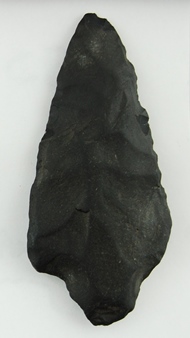Archaeology in Southern Maine

Maine has a rich prehistoric and historic heritage spanning thousands of years. Indigenous peoples have inhabited the land we now call Maine for the past 13,000 years. The Eastern Abenaki tribe, specifically the Almouchiquois, but others too, lived primarily in Southern Maine and here in the Kennebunks. They were part of the larger community of the Wabanaki or “People of the Dawnland.” The Brick Store Museum’s collection contains a few artifacts that represent this indigenous history. The collection reveals meaningful information about the indigenous peoples that lived in Southern Maine. Unfortunately, for the majority of these artifacts, the site from which they were recovered is unknown. This limits what we can learn from them. When artifacts are recovered without proper archaeological investigation into the context in which they are found, significant information is lost.
According to Dr. Arthur E. Spiess, Senior Archaeologist for the Maine Historic Preservation Office, very little archaeological research has been conducted in Southern Maine. There are only a few identified sites and very little is known of the archaeological resources that are important to our cultural heritage.
Many archaeology sites in Maine (and elsewhere) are under threatened with destruction by a variety of factors, including urban development, river erosion, and sea level rise. To combat the loss of cultural heritage, the Brick Store Museum has joined an initiative to support, advance and encourage archaeological research in the area.
